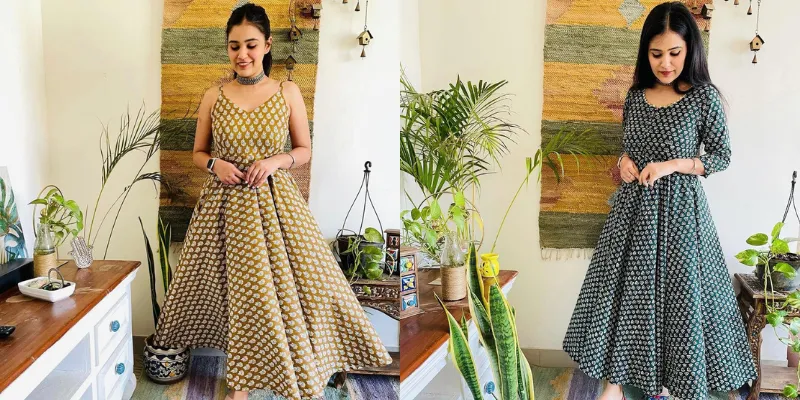This Gurugram-based sustainable clothing brand works with artisans and weavers to make handloom products for women
Bohemian Dream was co-founded by Komal Kaur and Stanley George in 2017 to revive Indian craft and bring handloom products to consumers.
Having worked in the apparel industry, ecommerce professionals Komal Kaur and Stanley George noticed that Indian crafts were slowly fading away from the market. They were either available at the traditional local mass markets or were sold under niche designer labels (where one gets contemporary design at a steep price point).
“Bohemian Dream was started with an idea to bridge this gap and increase the acceptability of these crafts among a wider audience,” Co-founder Komal Kaur tells SocialStory.
Based in Gurugram, the label sells Indie-Bohemian clothing inspired by Indian crafts. It was started in 2017, with a vision to bring Indian crafts and textiles in a new avatar, making them more acceptable and relevant to the youth.

Founders (L-R): Komal Kaur and Stanley George
The team
Komal Kaur and Stanley George, NIFT alumni and ecommerce professionals, quit their jobs at Myntra in 2017 to start . They met while they were studying at the National Institute of Fashion Technology (NIFT), Mumbai.
“While working in retail and ecommerce for more than six years, we observed that there are many sustainable fashion brands in the industry, which make contemporary silhouettes in traditional Indian fabrics, but very few operate at a price point that makes them acceptable to the masses. The Bohemian Dream was launched to bridge this gap,” say the founders.
The startup has a lean team of 16 people, taking care of all the aspects in-house – from designing to dispatching. Both the founders are quite involved in the design process and quality control.
The startup has a manufacturing unit in Delhi and an office in Gurugram.
The USP
The women-wear startup sells its products under three verticals – clothing, bags, and gift cards. Their clothing line includes dresses, jumpsuits, tops, and overlays.
All of their products are made using handloom and have traditional prints such as ikat and kantha work. Their bag collection consists of embroidered sling bags and clutch bags with colourful designs. The brand sells gift cards as well (Rs 1,000, Rs 2,000, and Rs 5,000) which can be redeemed at the online website for Bohemian Dream’s product offerings.
“Our brand’s USP is our design language and sharp pricing, which distinguishes us from our competitors. Having an in-house manufacturing setup allows us greater control over the product. We introduce new styles every week, ensuring a sense of freshness every time a customer revisits our POS,” adds Co-founder Stanley.
“As far as competition is concerned, Anokhi, Fab India, Tijori, and Jaypore to name a few – we are all in that space where we are trying to revive Indian crafts,” he says.

Dresses
Onboarding artisans and weavers
"We work closely with artisans and weaver clusters for developing prints and sourcing fabric. Everything – from designing to pattern making, cutting, stitching, and finishing – is done in our in-house production facility,” Komal adds.
The startup works with a few weaver clusters in Pochampally, Telangana and indigenous block printing units at Sanganer and Bagru, Rajasthan.
“We ensure fair pricing for all weavers working with us (directly and indirectly) and ensure that we offer consistent order volumes. Even during pandemic, we were able to support them financially by providing continuous business,” she says.
Upcycling fabric
For any apparel brand, one of the biggest wastage happens during QC and fabric cutting. is on a journey to become a zero-waste brand.
“We regularly upcycle our fabric wastage into making accessories and products like masks and shopping bags, which are sent free with almost every order,” Stanley says.
“We are currently working to eliminate plastics used in packaging and replace them with better and more environmentally-friendly alternatives, while maintaining the customer experience, targeting to go zero-plastic by the end of this year,” he adds.
To increase the acceptability, Bohemian Dream stuck to few basic points such as no compromise on quality and contemporary design aesthetics to appeal to younger audiences.
Funding and revenue
The bootstrapped venture was started with founders’ personal savings of Rs 8 lakh, and were successfully able to make the brand cash positive by the end of the first financial year.
“We clocked a revenue of Rs 4 crore in last financial year, and are targeting Rs 8 crore for this fiscal year,” says Stanley.
Apart from its own website, the startup sells via Instagram.
“Surprisingly, our Instagram gets direct sales, which contribute 50 percent. Around 46 percent of our business comes from repeat customers,” he adds.
The present and future
Women’s wear in India currently has 38 percent of the market share, which is growing at a much higher CAGR than men’s wear. By 2025, the market of women’s wear would be approximately Rs 2,89,518 crore, as per Indiaretailing.
“Artisanal women’s wear category is also growing rapidly; with more and more people choosing sustainable ways of life,” Komal says.
Bohemian Dream, which has a presence in 97 countries, claims to have seen more than one lakh visitors annually. The startup has serviced more than 50,000 orders so far.
“Our international orders account for 26 percent of our business, key locations being Malaysia, Singapore, the UAE, the UK, and the US,” Stanley says.
“We aim to strengthen our brand presence in Indian and global market, and create experience points for our customers. We are planning to launch our first store in Delhi/NCR by end of next year,” he adds.
Bohemian Dream is also in the process of increasing its assortment and product categories while working with more crafts from around the country.
“During the height of the COVID-19 pandemic, unlike other ecommerce websites, Bohemian Dream did not stop taking orders (we had notified the customers beforehand and extended the delivery timelines as per government norms). As a result, the company was able to continue business and support all the employees, their families, and people associated with the company with ease during the lockdown,” Komal says.
“While India's ecommerce order volume increased by 36 percent YOY (as per ibef.org), in the last quarter of 2020, Bohemian Dream saw an enormous growth of 220 percent,” she adds.







